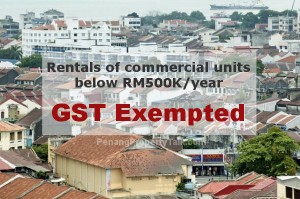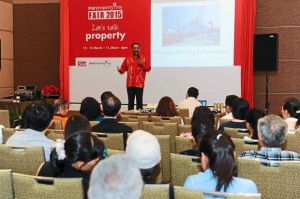More moves to curb housing loans seen

Wong: ‘Residential property loan growth will moderate this year.’
More selective measures on loans to the property sector, among others aimed at curbing speculation, could be in the pipeline judging from the strong lending to the industry and continued elevated home prices, according to analysts.
Analysts contacted tell StarBizWeek that the property measures will not be hard measures but more likely be selective and macro prudential-based, which could be introduced in the near term due to higher total exposure of financial institutions to the property sector.
Hard measures include those relating to real property gains tax and loan-to-value (LTV) ratio for property purchases.
Based on Bank Negara’s Financial Stability and Payment Systems Report 2014 total exposures of financial institutions to the property sector amounted to RM628.5bil or 23% (2013: 21.9%) of total financial system assets as at end-2014. Financial institutions here includes banks, development and selected non-bank financial institutions and insurers as well as takaful operators.
Bank exposures alone accounted for the bulk (95.4%) of this, with property-related financing and private debt securities (PDS) held by banks increasing slightly during the year to 26.6% (2013: 25.4%) of total assets of the banking system.
About 65% of bank exposures to property is concentrated in the residential property end-financing market, while end-financing for the purchase of land and commercial properties make up about 30% of total property-related exposures.
Total property loans ( residential and non-residential) as at January (2015) makes up 42% of banking system loans.
Some of the macro prudential measures to curb speculation in the property sector, analysts say, could be in the form of higher tax on non-owners of properties or homes occupied by non-owners as oppose to genuine owners of properties as practised in Singapore and the standardisation of the minimum price of property that can be bought by foreigners – which is at RM1mil currently – to all states in the country.
Malaysian Rating Corp Bhd (MARC) chief economist Nor Zahidi Alias agrees there is a possibility that macro prudential measures to curb speculation in the property sector could be unveiled in the near terms in view of the high total exposure of financial institutions to the property sector.
“Total exposure of financial institutions to the sector contined to climb to 23% of total financial system assets in 2014 from 21.9% in 2013.”
At the same time, he adds, home prices continued to remain elevated, estimated at 6.6 times of household median income.
“We foresee that more selective measures are likely to be introduced by the the central bank to ensure softer property loan growth in the near and medium term, although weaker economic growth in itself will reduce borrowers’ appetite for debt accumulation this year.
“In addition, souring business and consumer sentiment will also lead to stricter lending standards going forward,’’ he notes.
DBS Group Research analyst Lim Sue Lin says the research house will not discount the possibility of further measures for property lending.
“Take Singapore’s case for example. It took two years before the effect was seen in the sector.
“The republic abolished the Interest Absorption Scheme (IAS) – which is similar to the developers interest bearing schemes (DIBs) – in 2009 to curb speculation, but the impact was muted due to robust demand for properties and low interest rates in the country.
“It took Singapore two years to see a moderation in mortgage growth from a peak of 23% in August 2010 to 16% in September 2012, and finally 12% in September 2013. The first loan-to-value (LTV) ratio tightening measure there was introduced in February 2010,’’ she said in an email reply.
At the same time, Lim and other analysts say there is a need to monitor the applications and approvals for mortgages.
Among some of the broad cooling measures which had been introduced by Bank Negara for the property sector is the 70% LTV cap on a borrower’s third and subsequent property-financing facility, lowering of the maximum tenure for property loans to 35 years from 45 years, the abolition of DIBs, raising of the real property gains tax and increasing the cap on foreigners buying properties to RM1mil from RM500,000.
RAM Ratings co-head of financial institution ratings Wong Yin Ching says the rating agency does not expect further restrictions on loans to this sector in the near term with macro prudential measures on property lending gradually achieving their desired impact.
“Although residential property loans grew by a strong 13% in 2014, property loan applications were visibly lower while loan approvals were flat last year.
“This lends support to our view that residential property loan growth will moderate this year.
“These cooling measures have also significantly slowed down growth in higher-risk personal financing and credit card facilities,” she adds.
Sharing the same views as Wong, OCBC Bank (M) Bhd country chief risk officer Jeroen Thijs notes: “The intended effects of the macroprudential and fiscal measures introduced since end 2013 seem to be having an effect as the rate of growth in the housing price index has slowed down markedly.
“As such, we do not anticipate the central bank will introduce any additional measures in the short term.”
On the rising household debt to GDP in Malaysia at 87.9% last year (2013: 86.7%), Wong says while she acknowledges Malaysia’s relatively high household debt to GDP level, RAM Ratings does not expect a systemwide deterioration in household loan quality.
This ratio is expected to stay high, reflecting the fundamental demand for home and vehicle financing by the young population, she says, adding that to date, the asset-quality indicators of household loans remain benign.
Against a backdrop of low employment rate, still-healthy domestic economic growth and accommodative interest rate environment, any slippage in household credit quality is expected to be tolerable, Wong says.
Source: StarProperty.my

 The Real Estate and Housing Developers’ Association Malaysia (Redha) expects property prices to increase by 6.2% once the Goods and Services Tax (GST) kicks in on April 1, due to certain building materials which are taxed under the regime.
The Real Estate and Housing Developers’ Association Malaysia (Redha) expects property prices to increase by 6.2% once the Goods and Services Tax (GST) kicks in on April 1, due to certain building materials which are taxed under the regime.

